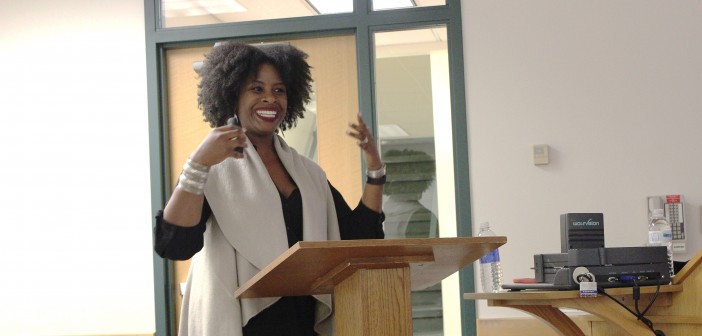During Wednesday’s visit to Lehigh, Dr. Tamura Lomax, co-founder of “The Feminist Wire,” discussed how we can use media to produce our own kind of knowledge.
“Media can serve as a way to oppress and empower,” Lomax said in her talk entitled “Mediating Feminisms: Feminism, Race and New Media.” “I can change the story. I can change the image.”
Inspired by cultural theorists, “The Feminist Wire” was created to change the view of the discourses that people are born into. According to Lomax, the media publication’s vision is to bring together feminists, anti-racists and anti-imperialists to use the power of media to move away from societal stereotypes.
“People are not to themselves who they are to the world,” Lomax said. She bases this idea off of her signifying experience as THE Black Woman and other women over time that have continued to be animalized and hyper-sexualized.
Lomax used the current examples of Amber Rose and Mo’ne Davis — two women have both been sexually-shamed and referred to as “sluts” by the media. This idea, again, she referred back to the discourse and stereotypical image that black women are born into.
Lomax uses the term “pornotropia” to describe the context in which these stereotypical images are portrayed through the media. “Pornotropia” makes you see more than you actually “see,” creating a false sense of identification and mixing fact with fiction, she said. Through this type of lens, because you are one thing, you are also ‘x’, ‘y’ and ‘z.’ The slut-shaming and hyper-sexualizing of black women is associated with this pornographic seeing of race.
Yet, Lomax says that nothing is ever said to the men; they are supposed to be out conquesting and proving their masculinity while women continue to be hyper-sexualized.
“You get to name me by what you’re doing to me,” she said.
Lomax hopes that through a focused lens of feminism, people can begin to tell a different story.
“What do we intend to say about ourselves or intend to say about others?” she urges people to ask through new media. “Critical reflection and acknowledgement to ourselves and community must always be present.”
Bonnie Kwon, ’17, was particularly affected by Lomax’s presentation because of her heritage.
“I liked how she talked about how our society is so focused on difference, especially being an Asian American in the community,” Kwon said. “It’s subconscious, realizing where we have to go from here.”
Lomax is currently a visiting assistant professor of Gender, Sexuality, and Women’s Studies at Virginia Commonwealth University. Her newest book, “Losing the Yoke: Black Feminist Readings of Black Religion and Black Popular Culture,” along with “The Feminist Wire,” will continue the discussion of how representational technologies establish notions of innate differences across gender and race.






Comment policy
Comments posted to The Brown and White website are reviewed by a moderator before being approved. Incendiary speech or harassing language, including comments targeted at individuals, may be deemed unacceptable and not published. Spam and other soliciting will also be declined.
The Brown and White also reserves the right to not publish entirely anonymous comments.